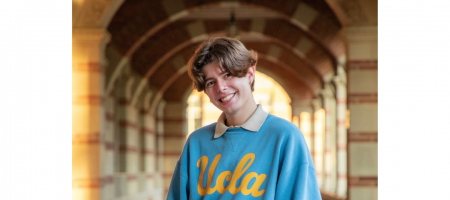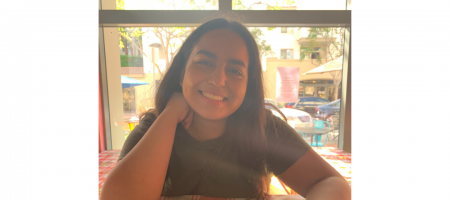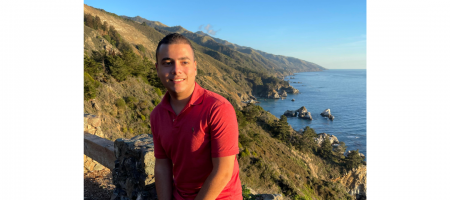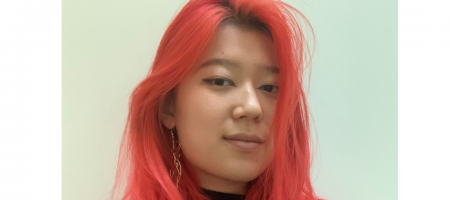Student Spotlight – Herman Luis Chavez
Meet UCLA undergraduate researcher Herman Luis Chavez!
Herman Luis Chavez majors in Ethnomusicology and Comparative Literature and is in our Mellon Mays Undergraduate Fellowship Program (MMUF)! The title of his project is “Composing Bolivia: The Politics and Perspectives of Mestizaje and Indigenismo in Atiliano Auza León’s Historia de la Música Boliviana.” Their focus is to bring a fundamentally interdisciplinary lens to studying Bolivian music and its accompanying politics. Their best piece of advice is to explore your interests with UCLA’s immense resources and faculty support!
How did you first get interested in your research project?
I discovered my project on a visit our family’s home country of Bolivia. We had decided to visit my tía one afternoon—I immediately noticed the piano that sat next to the door, to the right after walking through the entrance. It was evident that the piano hadn’t been tuned in years—what was meant to sound like a major triad was as an ethnically ambiguous child, simultaneously major and minor and augmented all at once. Regardless, I was delighted. I had begun developing my piano chops after a year of college coursework and was eager to see if I could sight-read despite the unwarranted atonality of a supposedly equally-tuned instrument. Burrowed in my tía’s piano bench amidst an unkempt collection of sheet music, I found Atiliano Auza León. At the very bottom of the pile, beneath the Hungarian Marches and Eine Kleine Nachtmusiks and other reductive arrangements, was the piano score for 6 Danzas Bolivianas del ciclo ‘Runas’ por violín y piano, with the violin part gently tucked into the first spread. To see a piece by a Bolivian composer among the expected scores of the German canon surprised me. I was even more shocked that, upon closer inspection, 6 Danzas was based on the popular folkloric tunes that I had grown up listening to in my Bolivian and Bolivian-American households. My research began here: locating an art music composer among Bolivian urban modernity and beneath a European musical canon.
What has been the most exciting aspect of your research so far?
Although there have been many thrilling aspects of my research, from connecting the dots of disparate secondary material to using UCLA Library resources, the most exciting part of my research so far has been the opportunity to interview Atiliano Auza León, the composer who is the subject of my thesis. I never thought I’d get the chance to speak directly to him, but by chance we were able to do a remote interview. This has not only given me ethnographic experience, but also the ability to place his written works and compositions into the context of his personal experience.
What has surprised you about your research or the research process?
Learning more about myself has been an unintended consequence of my research. Although I knew I would learn more about my Bolivian heritage the more I engaged in this research, I didn’t know that my worldview—in relation to institutional cultural power, thinking about sound and music, and the processes of (re)producing knowledge—would be so affected to the point in which I would also be able to reflect on some of the fundamental truths of my personal experience. It has been so exciting to see how transformative the research process has been in terms of my own perspectives as I have interrogated my own Bolivian diasporic identity while engaging in my research.
What is one piece of advice you have for other UCLA students thinking about doing research?
Your research questions are worth exploring, and there are so many avenues with which to do so! From the URC programs to departmental honors to individual studies, you can and should explore your interests with UCLA’s immense resources and faculty support. Many of us undergraduate students—particularly students of minoritarian communities and subjectivities—may not see the knowledge which we have experienced or have interest in represented in our coursework or in faculty research. That is certainly the case for me, as there are probably a handful of scholars in the entire country who study Bolivian sound and music. I found a faculty member who would support me and simply plunged in, and I’ve been able to explore the works of a Bolivian composer who has likely never been performed or studied in the United States. I encourage all undergrads (and especially minoritarian students) to take that plunge with their own ideas and interests, no matter how small or niche they might think they are, especially while they have the resources of UCLA. You can do it!
What effect do you hope your research has in your field, at UCLA, in your community, or in the world?
I see my thesis as one step in my scholarly journey, and therefore one that starts off on an explorative, if devout, foot: I hope to bring a fundamentally interdisciplinary lens to studying Bolivian music and its accompanying politics. I hope that as I continue writing in this manner, I will encourage the academy to see studies of sound and music as necessarily holistic. When I insert certain critiques about how Auza León constructs a discourse or presents research in my thesis, I provide my own application of my studies in comparative literature, ethnomusicology, musicology, and ethnic studies to exploring Auza León’s work. Thus, in part, this thesis is practice for my interdisciplinary praxis. I am also hoping to bring the work by a Bolivian music historian to the fore in a country where such history and historiography may not be considered or even valued. Yet, this motive does not preclude scholarly seriousness: I approach Auza León with a critical lens that first and foremost seeks to analyze his publication with an eye for discursive moves, exploring how he may contribute to certain epistemological notes around Bolivian music. Overall, I seek to contribute to the historical ethnomusicology of Bolivia and its paradigms, and thus thinking through how this history is presented in tomes such as Auza León’s is important not only for the field to learn about Bolivian music, but also for us to understand the epistemologies that surround such historiography and how they might shape our contemporary understanding. As I work on translating my thesis, I hope my work will be accessible to a Bolivian audience as well, and that this is the start of many projects about Bolivian music and culture on an international stage. Just as it is important for me to push the academic disciplines in an interdisciplinary manner, it is also important for me to represent my country, which has not been studied or taught internationally to the degree to which it might be. I am committed to continuing my work in interdisciplinary sound studies and Bolivian cultural studies—this thesis is just one piece of this expanding puzzle.





